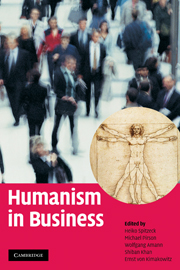Book contents
- Frontmatter
- Contents
- List of figures
- List of tables
- List of editors and contributors
- Acknowledgements
- Humanistic Management Network: paving the way towards a life-serving economy
- Introduction
- Part 1 Philosophic-historical grounding of humanism
- Part 2 Towards an integration of humanism and business on a systems level
- Part 3 Humanistic management
- Part 4 The individual as a change agent for a humane business society
- 19 Ethical codes at work
- 20 The daunting challenges of globalization and the power of individuals in cross-stakeholder networks for a humanistic face of globalization
- 21 The leader as responsible change agent: promoting humanism in and beyond business
- 22 Quiet leadership – a way to sustainable positive change
- 23 Everyone a changemaker: social entrepreneurship's ultimate goal
- 24 Social business entrepreneurs are the solution
- 25 Concluding observations
- Index
23 - Everyone a changemaker: social entrepreneurship's ultimate goal
Published online by Cambridge University Press: 25 January 2011
- Frontmatter
- Contents
- List of figures
- List of tables
- List of editors and contributors
- Acknowledgements
- Humanistic Management Network: paving the way towards a life-serving economy
- Introduction
- Part 1 Philosophic-historical grounding of humanism
- Part 2 Towards an integration of humanism and business on a systems level
- Part 3 Humanistic management
- Part 4 The individual as a change agent for a humane business society
- 19 Ethical codes at work
- 20 The daunting challenges of globalization and the power of individuals in cross-stakeholder networks for a humanistic face of globalization
- 21 The leader as responsible change agent: promoting humanism in and beyond business
- 22 Quiet leadership – a way to sustainable positive change
- 23 Everyone a changemaker: social entrepreneurship's ultimate goal
- 24 Social business entrepreneurs are the solution
- 25 Concluding observations
- Index
Summary
Rodrigo Baggio grew up in Rio de Janeiro loving computers. As he matured into an extraordinarily tall, thin man with a hugely wide smile, he became a computer consultant. However, from early on, he was one of the few in his generation who noticed – with concern – that the young people growing up in the favelas on the hills overlooking his middle-class neighborhood had no access to this digital world.
Because he has the great entrepreneur's tenacity of observation and thought as well as action, he decided he had to take on the digital divide – well before the phrase came into currency – and he has been pursuing this vision relentlessly ever since. While beginning to work toward this dream as a teenager, he learned just how motivated and capable of learning the young people in the favelas were. And also how competent the favela community was in organizing. This respect underlies the central insight that has allowed Rodrigo to have a growing multi-continental impact.
Rodrigo provides only what the community cannot: typically computers, software, and training. The community does the organizing, finding space, recruiting the students and faculty, and providing ongoing administration. The result is a uniquely economical model, and also one where, because the investment strengthens the broader community, it is self-sustaining and a foundation for other initiatives long into the future. Rodrigo's chain of hundreds of community-based computer training schools now serves hundreds of slums across Latin America and Asia.
- Type
- Chapter
- Information
- Humanism in Business , pp. 388 - 401Publisher: Cambridge University PressPrint publication year: 2009
- 3
- Cited by



